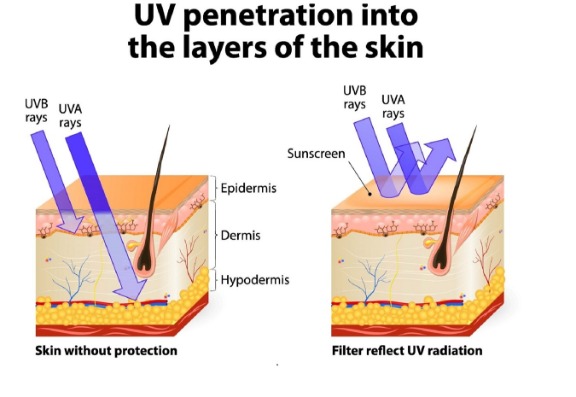With temperatures reaching up to 31 degrees in recent weeks, a lot of Brits will have experienced sunburn. One of the most common places men experience sun exposure is on their head.
Does getting a sunburn on my scalp mean that hair loss is more likely to happen?
It’s thought from an evolutionary perspective that our hair works as a barrier to help protect the top of the head/scalp from the sun.
Of course, you can still get sunburn even with hair, particularly if it’s already thinning, increasing the risk of developing skin cancer which is another reason to practice sun safety.

We frequently get people coming into the clinic who have experienced sunburn on a bald patch/thinning hair - often experiencing this is their cue to come in and see us about hair restoration both from an aesthetic reason, but also as a way to protect the scalp from future sun damage. For the majority of people who aren’t experiencing hair loss, however, if you do get sunburn on your scalp, although you may lose a few hairs if your scalp peels, the chances are it will grow back.
In summary, no, getting a sunburn on your scalp doesn't mean that hair loss is more likely to happen, but regardless you should take steps to prevent sunburn from happening in the first place. Ensuring you’re wearing a wide-brimmed hat and avoiding the hottest parts of the day are good measures to put in place.

Is hair loss more common in summer?
A study conducted by the British Journal of Dermatology, which analysed Google searches for terms related to hair loss between 2004 and 2016, showed that the greatest spikes came during summer and autumn. Although this research doesn’t actually prove that the people searching for the terms are suffering from hair loss, and it doesn’t point to a biological reason behind it, it’s clearly a common concern.
Of course, losing between 50 and 100 hairs a day is completely normal, and it can be more noticeable if you’ve gone a few days without brushing or washing your hair, where it may seem as if larger clumps are coming out. If you’re noticing it more over the warmer months, there are a few potential reasons for this.
If you’re a cat or dog owner, you may have noticed that they shed a lot more fur during summer, as they lose the winter coat that they grew to keep them warm. Well, it seems as if humans could follow a similar pattern. It does make sense that as the weather heats up, our bodies would find a way to keep us cooler, by shedding unnecessary hair.
One Swedish study, which monitored hair loss in 800 women over the course of six years, showed that they generally had a greater proportion of ‘telogen’ hairs during summer, meaning hairs in their final stages of growth – the most likely hairs to fall out. It seems as if the scalp holds on to hair during early summer to protect the scalp from sunburn, and then sheds it towards the end of summer.
Is there anything I can do to protect my hair during the summer months?
It’s a good idea to take extra care of your hair during summer. UVA and UVB light waves can damage your hair, making it lifeless and dull, whilst chlorine and saltwater can dry it out, making it brittle and prone to breaking. A sun protectant spray can work wonders, whilst a deep conditioning hair mask or oil mask can help to replenish your hair.
Your hair may help to protect your scalp from sunburn, but it’s still vulnerable to sunlight. Apply your usual sunscreen to any exposed areas of your scalp and keep your head covered with a hat when you’re out and about.

For the majority of people, summer hair loss is nothing to worry about, but if you’re noticing an excessive amount of shedding, it might be worth speaking with a hair loss expert.

Are certain hair types more susceptible to sun damage?
Light-coloured or fine hair is more vulnerable to sun damage as it lacks pigment which can help protect against the sun’s rays.
In addition, your hair is also more fragile/prone to sun damage if you have thinning or tightly coiled hair.
In order to prevent damage, keep hair out of the sun as much as possible, wear a wide-brimmed hat and look for specific hair SPFs that can help protect against UV rays.
If you want to read more, the experts at Consulting Room really know what they're talking about and have put together non-surgical hair loss, hair transplant, hair loss drugs and Hair loss FAQs just for you.
If you have more questions, you can use the non-surgical hair loss, hair transplant, hair loss drugs and Hair loss questions feature to talk to our panel of trained medical experts.
If you're keen to get started with any of these treatments right away then you're in luck - those clever folks also have a list of trusted, accredited non-surgical hair loss, hair transplant, hair loss drugs and Hair loss clinics in your area.
Many thanks to the author of this blog Dr Bessam Farjo who is the founding director of the renowned Farjo Hair Institute in Manchester and London.
Dr Farjo has been delivering top-quality hair restoration for hundreds of patients.
He is considered one of the UK's leading hair loss experts and hair transplant surgeons.

Find out all the different Hair Restoration treatments available so you don’t have to suffer from Alopecia alone!
Hey, wait!
Before you go.....
Let's stay in touch, pop your details here and we'll send our editor's hand-picked updates on your fave subjects.